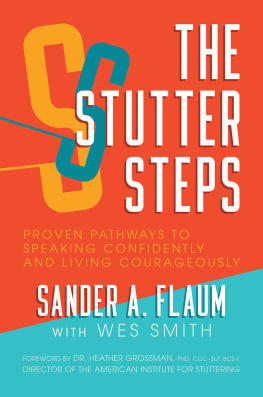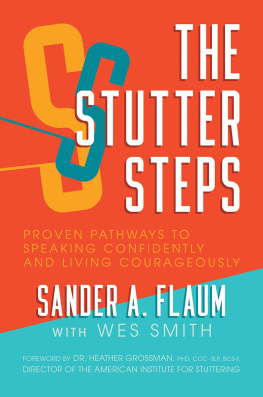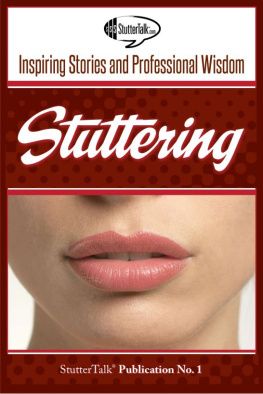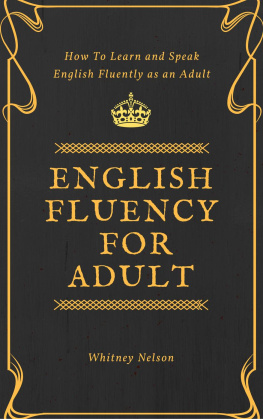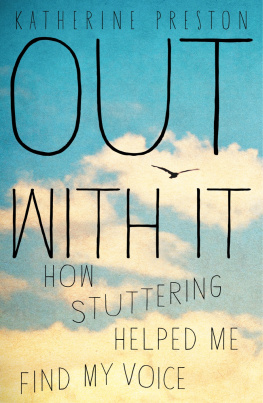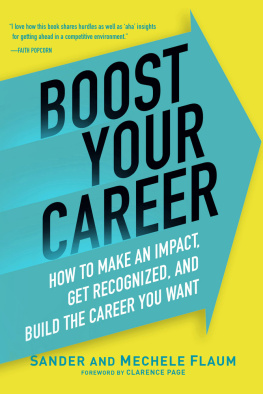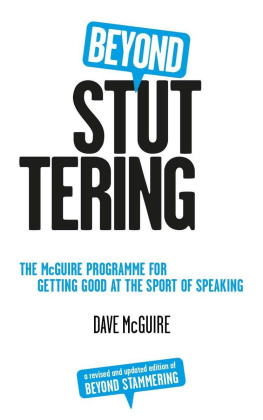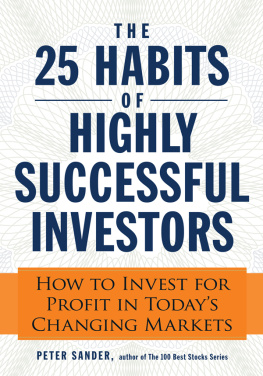Advance Praise for
The Stutter Steps
Sanders book is not only instructional, it is inspirational. In telling his own story and that of so many other stutterers while coupling it with an array of advice, this book combines what is so desperately neededsound counsel and emotional support.
Michael Sheehan , Sheehan Associates
A book that provides an important window into this mysterious challenge. Stuttering is deeply personal for Sander, and he symbolizes the courage to speak freely and live fearlessly.
Aaron Graff , Executive Vice President, Chief Commercial Officer, Ferring Pharmaceuticals
Sander Flaums friendship and support over the years has been an inspiration to me as a fellow stutterer. In this book he communicates the anguish of this genetic condition as he offers a better understanding of stuttering to those who dont, and potential treatment solutions to those who do.
Michael Conforti , Director Emeritus, Clark Art Institute; Adjunct Professor, Williams College
Good advice! Wish Id had the guts to go ahead and stutter. Hiding my stutter hurt me more than my stuttering ever did.
John Stossel , TV Anchor
Sander Flaums most recent book is a special gift to the over 70 million people in the world who are challenged by stuttering. His thoughtful and engaging way of dealing with the subject will give encouragement not only to those of us with speech disorders but also to those interested in moving beyond the many myths associated with this misunderstood affliction.
Susan Reichardt , Ph.D.
By embracing the importance of accepting yourself for who you are, Sander offers the reader the encouragement and inspiration needed to speak freely and live fearlessly . He dives deeply into the latest therapeutic approaches to stuttering treatment and provides real-life examples of how successful individuals learned to use their stuttering as a source of strength. The Stutter Steps is an excellent resource for those looking to gain confidence and communicate more effectively.
Nolan Russo Jr. , Vice President, Business Development, Capital Printing
Sander is a mentor and model for me. What he has achieved in his professional and personal life is remarkable, and his tireless efforts on behalf of the American Institute for Stuttering inspired me to follow in his footsteps as the newest Chair. The Institute and the stuttering community are meaningfully better off because of Sander, and we will always be grateful.
Eric Dinallo , Chair of Insurance Regulatory Practice at Debevoise & Plimpton LLP
The Stutter Steps should be must-reading for everyone afflicted with this speech disorder and their loved onesespecially for its messages that youre not alone, and that highly effective therapy is available.
Alan Tonelson , Founder, RealtyChek, a public policy blog
A POST HILL PRESS BOOK
The Stutter Steps:
Proven Pathways to Speaking Confidently and Living Courageously
2021 by Sander A. Flaum
All Rights Reserved
ISBN: 978-1-64293-653-7
ISBN (eBook): 978-1-64293-654-4
Cover art by Cody Corcoran
Interior design and composition by Greg Johnson, Textbook Perfect
Although every effort has been made to ensure that the personal advice present within this book is useful and appropriate, the author and publisher do not assume and hereby disclaim any liability to any person choosing to employ the guidance offered in this book. The information and advice herein is not intended to replace the services of trained health professionals or be a substitute for individual medical advice. You are advised to consult your health professional with regard to matters related to your health and speech.
No part of this book may be reproduced, stored in a retrieval system, or transmitted by any means without the written permission of the author and publisher.

Post Hill Press
New York Nashville
posthillpress.com
Published in the United States of America
This book is dedicated to my beautiful and late wife,
Mechele, who died in November 2017.
We had a wonderful life together.
She was inspiring, supportive,
and the most loving person I have ever known.
May she rest in peace.
Contents
By Dr. Heather Grossman, PhD, CCC-SLP, BCS-F, Director of the American Institute for Stuttering
M y career as a speech-language pathologist began in the late 1980s. At the time, most of the therapy techniques for both children and adults who stuttered focused on physical tools that were intended to eliminate the persons stutter.
I quickly noticed, however, that while these therapy techniques did indeed increase fluency to a certain degree, many of my clients could not successfully utilize them in the situations where they most desired fluency.
The training I had received in graduate school was largely focused on the physical components of stuttering. Within the therapy session, we would present clients with tools such as easy onsets, light articulatory contacts, pausing, and so on. We would then work on transferring the skills by taking clients to talk in stores and restaurants.
While counseling was considered an important part of the therapeutic process, we were inadequately trained for that aspect of treatment. What most therapists were calling counseling actually amounted to little more than talking through the personal challenges of transferring fluency skills.
Not only did clients find it difficult to use their tools consistently, many commented that they did not like the way they sounded using the tools. A large proportion found that in high-stress situations, their fluency skills would fly out the window.
I did not understand this dynamic at the time, but we now know that when a person who stutters enters a highly feared situation, a fight or flight response can kick in. In this state, the bodys physiological tension is sky-high. The ability to engage higher cognitive centers is lost. It started to make more and more sense that the fear of stuttering and speaking could render many speech tools useless.
Dedicated to learning as much as I could about stuttering, I immersed myself in the stuttering self-help community. I spent a lot of time listening. When I first attended the annual conference of the National Stuttering Association (at the time, the National Stuttering Project), I was quite shocked at the intensity of animosity directed toward speech-language pathologists. I learned that many people felt that their lack of success achieving and/or maintaining fluency through speech therapy created a secondary cycle of hopelessness, shame, and guilt, which only made their stuttering worse , ultimately .
I realized that we needed to approach stuttering from an entirely new perspective. In addition to the invaluable education I received from people who stutter and attending self-help conferences, I returned to graduate school in 2005. There, I attained my PhD. My thesis was on the phenomenon of voluntary stuttering.
I learned to approach stuttering from a client-driven perspective, while recognizing the many variables that contribute to each individuals unique stuttering profile. I immersed myself in exploring Rational Emotive Behavior Therapy as a way to help people who stutter. This approach targets the unhelpful core beliefs that people who stutter tend to hold about themselves and their speech.

